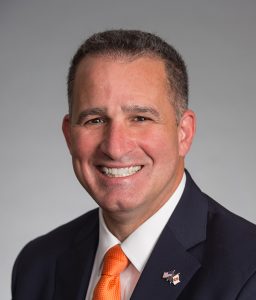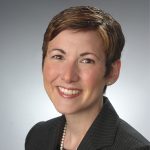 Michael Frasciello, a respected leader and longtime advocate for continuous learning who was appointed interim dean of University College in January, has been named as the new dean of the college. The appointment, which was recently approved by the Board of Trustees, is effective immediately.
Michael Frasciello, a respected leader and longtime advocate for continuous learning who was appointed interim dean of University College in January, has been named as the new dean of the college. The appointment, which was recently approved by the Board of Trustees, is effective immediately.
“Michael is committed to the value and importance of distance, online and part-time learning. He has reinvigorated University College through his leadership and skills in strategic planning and collaboration,” says Michele G. Wheatly, vice chancellor and provost. “His background and experience are essential to what University College needs as a leading example of continuing and online education in higher education.”
As interim dean, Frasciello took significant steps to re-mission University College, streamlining business operations and simplifying the business and academic portfolio. He launched a new program in the form of an online and residential bachelor’s of professional studies in cybersecurity administration, as well as two new “pathways” to undergraduate online degree programs (A.A. in liberal studies and B.A. in liberal arts). He has also acted to create the Syracuse University Center for Online and Digital Learning, as a One University center of excellence for online education.
“During his tenure as interim dean, Michael has proven to be a skilled leader and innovator, setting the conditions for University College to successfully compete in the dynamic marketplace for distance education,” says J. Michael Haynie, vice chancellor for strategic initiatives and innovation. “We are pleased that he will remain at University College in his new role as dean and furthering the important work of preparing both traditional and nontraditional students for a lifetime of success.”
Prior to accepting the position as interim dean at University College, Frasciello served as director of online learning for the College of Engineering and Computer Science. In that role, he directed the college’s online graduate programs and operations, while at the same time co-directing Syracuse University’s Distance Education Work Group. Before joining the College of Engineering and Computer Science, Frasciello served, for more than a decade, as the assistant dean of University College, managing a portfolio that included direct oversight of online learning, information systems, marketing, enrollment management and public relations.
“I am grateful to Provost Wheatly, Vice Chancellor Haynie and the Board of Trustees for this honor and opportunity to steward University College. It has been a wonderful experience working with an exceptionally talented college staff and leveraging our collective potential to innovate and grow,” Frasciello says. “I look forward to being part of the important work being done at University College and serving our students.”
Frasciello, who conducts research in continuing education and online learning, has taught several writing and technical communications courses in residential, online, condensed and blended formats. An experienced presenter on topics of digital learning and instructional technology, he is involved with several professional and academic organizations, including the American Society for Engineering Education, Association for Continuing Higher Education, Online Learning Consortium, Institute for Engaged Leaders in Online Learning and the University Professional and Continuing Education Association.
A 10-year veteran of the U.S. Air Force, Frasciello holds a doctorate of philosophy from the College of Arts and Sciences, a master of professional communication from Westminster College, a bachelor of science in political science and government from the University of Maryland and an associate of applied science from the Community College of the Air Force.

 Karen Bull, a recognized leader of instructional excellence in online and continuing education, has been named associate dean of Academic Affairs for the college. The appointment is effective immediately.
Karen Bull, a recognized leader of instructional excellence in online and continuing education, has been named associate dean of Academic Affairs for the college. The appointment is effective immediately. Michael Frasciello, a respected leader and longtime advocate for continuous learning who was appointed interim dean of
Michael Frasciello, a respected leader and longtime advocate for continuous learning who was appointed interim dean of